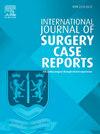Bronchial stenosis in an 8-year-old with Moebius syndrome: A case report
IF 0.7
Q4 SURGERY
引用次数: 0
Abstract
Introduction
Moebius syndrome is a rare congenital condition involving underdevelopment of cranial nerves VI and VII, often causing facial palsy. Also rare, bronchial stenosis may cause recurrent respiratory infections. There is scarce evidence on the outcomes of pediatric patients undergoing open surgical repair for congenital bronchial stenosis.
Presentation of case
An eight-year-old male with Moebius syndrome and tracheostomy-dependent since infancy, presented with fever, severe respiratory compromise and left lung atelectasis. Bronchoscopy revealed severe stenosis of the left main bronchus and the right upper lobe bronchus. Despite two bronchoscopic balloon dilations, the obstruction recurred. The patient successfully underwent bronchoplasty under extracorporeal membrane oxygenation (ECMO) with resection of the stenotic segment and end-to-end anastomosis. After 97 inpatient days, he was discharged home with usual nocturnal ventilation support.
Discussion
The diagnosis of congenital bronchial stenosis (CBS) is difficult because of its rarity and nonspecific presentation. Severe cases may warrant definitive surgical repair and ECMO provides critical support to ensue oxygenation and hemodynamic stability while the airway procedure takes place. Open bronchoplasty offers a safe and effective option when bronchoscopic management fails.
Conclusion
Early recognition of CBS in children with complex comorbidities such as Moebius syndrome is key for prompt management. Multidisciplinary efforts are crucial for optimal patient outcomes.
8岁儿童莫比乌斯综合征支气管狭窄1例。
莫比乌斯综合征是一种罕见的先天性疾病,涉及颅神经VI和颅神经VII发育不全,常引起面瘫。同样罕见的是,支气管狭窄可引起反复呼吸道感染。对于先天性支气管狭窄的儿童患者进行开放性手术修复的结果,目前还缺乏证据。病例介绍:一名八岁男性,患有莫比斯综合征,自婴儿期起气管切开术依赖,表现为发烧,严重呼吸窘迫和左肺不张。支气管镜检查显示左主支气管和右上叶支气管严重狭窄。尽管两次支气管镜球囊扩张,梗阻复发。患者在体外膜氧合(ECMO)下成功行支气管成形术,切除狭窄段并端对端吻合。住院97天后,患者在正常夜间通气支持下出院。讨论:先天性支气管狭窄(CBS)的诊断是困难的,因为它的罕见和非特异性的表现。严重的病例可能需要明确的手术修复,ECMO在气道手术时提供关键的氧合和血流动力学稳定支持。当支气管镜治疗失败时,开放支气管成形术是一种安全有效的选择。结论:早期识别患有莫比乌斯综合征等复杂合并症的儿童CBS是及时治疗的关键。多学科的努力对患者的最佳治疗效果至关重要。
本文章由计算机程序翻译,如有差异,请以英文原文为准。
求助全文
约1分钟内获得全文
求助全文
来源期刊
CiteScore
1.10
自引率
0.00%
发文量
1116
审稿时长
46 days

 求助内容:
求助内容: 应助结果提醒方式:
应助结果提醒方式:


